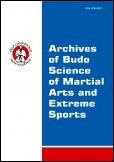2015, Volume 11, Issue 1
Validity and reliability of non-apparatus and quasi apparatus flexibility tests – verification during health-related training based on judo
Dariusz Mosler1
1Faculty of Physical Education, Gdansk University of Physical Education and Sport, Gdańsk, Poland
Author for correspondence: Dariusz Mosler; Faculty of Physical Education, Gdansk University of Physical Education and Sport, Gdańsk, Poland; email: dariusz.mosler[at]gmail.com
Full text
Abstract
Background and Study Aim: Insufficient body’s motor preparation not only for specific physical effort during judo training, but in general is one of a significant factor contributing to risk of body injuries. Normal range of motion in each joint and appropriate state of body stimulation before physical effort is decreasing the risk of body injuries. It refers especially to a practice fighting and other shot-lasting extreme efforts. The purpose of this study is recommendation of this or those from non-apparatus and quasi apparatus flexibility tests, which fulfills the highest standards of validation procedure relativized by changing state of body stimulation during training, therefore also flexibility level of muscles and joints.
Materials and Methods: Eight male subjects who are attending to judo recreation training sessions (as a form of health-related training) were examined. Their age ranged from 18 to 43 years (mean 28.8 ±8.5) and their training experience ranged from 0.5 to 3 years (mean 1.4 year). In assessment, three flexibility tests were used each time in three different training situations, switching the order of their usage: forward bending test – finger-floor distance (FFD); modified measurement of finger-floor distance – self-assessment Bending scale (SABS); self-assessment sit reach test (SASRT). None of applied test was favored, because order of its application was switched each time. Intensity zones of exercised was determined using criteria determined by Pollock et al.
Results: There is no link between state of body stimulation during judo recreation training and change of flexibility level of tested subjects. SASRT and FFD test fulfilled the criteria of validity and reliability as an assessment tool for measuring flexibility level in different states of body stimulation and different training situations. SABS test did not fulfill enough criteria of validity and reliability, so it has not been acknowledged as a worthy tool for health-related training.
Conclusion: In terms of application in sport training and behavioral therapy, SASRT deserves the highest recommendation. It fulfill the criteria of validity and reliability of assessment in a different states of body stimulation. At the same time it is the simplest and the safest in application from flexibility tests.
Key words: extreme effort, heart rate, intensity zones, motor safety, validation procedure





